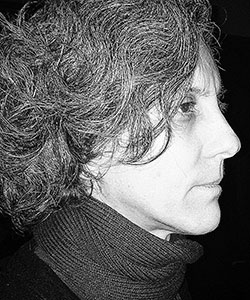Charter Day panelist preview: musicologist Judith Peraino
By Sue Brightly
Cornell professor of musicology Judith Peraino will speak at Charter Day: A Festival of Ideas and Imagination. Her panel, “Seeing and Hearing at the Cutting Edge: The Time of Experience,” will be held Sunday, April 26, 9-10:30 a.m., in Alice Statler Auditorium.

Your work focuses on several areas that seem quite divergent: medieval music, rock music and queer theory. How are they related?
The thing that connects the areas I work on is the fundamental idea of how music shapes subjectivity and identity, and a sense of self and what we think of as self-expression. In medieval music I work on troubadour and trouvère music, what is mostly known as courtly love songs. The love song is very much a popular topic for medieval audiences as well as rock audiences. One of the questions I had was, why all these songs about love in the Middle Ages? And it turns out, medieval love songs are extremely complicated, very sophisticated, almost avant-garde poetry. Everyone’s singing about love, but love becomes this big cipher for all kinds of other issues of the self.
So what ties these areas of study together is – love?
In some sense it’s about love, but it’s also what we’re doing with our bodies when we are making music. There’s no doubt that music and musical practice is infused with issues of body and gender and sexuality. Music and sex are very closely linked – that sense of ecstasy and euphoria and chills.
What interests you about this panel and what you’ll be talking about?
Music and the world of art and architecture, and especially the cutting edge of thinking about these realms, are quite related in terms of the coordinates of space and time. Some of my medieval work focuses on time issues from questions of rhythm – how do you notate time? As a medievalist, looking at centuries-old notation, how do we know if we’re getting it right? We have to do a lot of interpretation, and a lot of it stems from language that is wrapped up in philosophical treatises, and the treatises on time and music borrow a lot of language from other disciplines so that it becomes a sort of interesting problem of what kind of time they’re talking about. I think there could be quite an interesting discussion in terms of putting together these unusual combinations; I think there’s a lot on the meta-level that we can connect.
Charter Day celebrations are a “festival of ideas and imagination.” What’s an example of something that inspires your creative process?
I was reading interviews by David Bowie, and he said something very curious about Mick Jagger – that he’s a mother figure. So I wrote an article on it, what he might mean, what was the context. Anything can spark a moment of imaginative inquiry. And I think that the best possible scholarship and the best possible teaching is to let that stuff work – the spark, the imaginative connections.
Imagining a similar panel in the future. What do you think the cutting edge of arts education will look like in 50 or a 100 years?
This is an important question, because if you want to envision anything in the next 50 years, let alone 100 years, we have to try to resist the idea that education is just about getting a job at the other end. The humanities are now always forced to justify themselves, and that is really chilling, in that there’s no value beyond the ends of employment. There’s no attempt to talk about the humanities in terms of a moral value, a social good, a spiritual enhancement, an ability to understand diverse points of view and getting along. The value of the humanities is to understand other people. … And really the only way to do that is to become a very careful listener and learner, and to develop a complex way of seeing the world. So valuing difference, valuing complexity, teaching how to deal with complexity, teaching how to think complexly – that’s fundamentally what our job is, whether I do it through music or someone does it through architecture. … We are going to blow up the world or destroy the Earth and destroy each other if we don’t figure out how to get along better. And that means education and learning to be more flexible in your thought – being agile as a thinker.
Sue Brightly is the content manager in the Division of Human Resources and Safety Services.
Media Contact
Get Cornell news delivered right to your inbox.
Subscribe